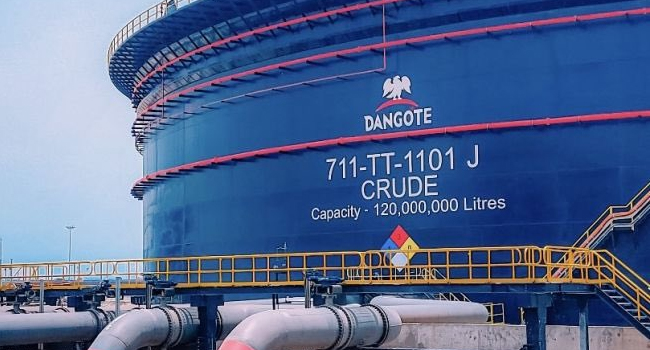The Federal Government’s committee, established to oversee the sale of crude oil to local refineries in naira, has reached an agreement with the Dangote Petroleum Refinery to begin the distribution of Premium Motor Spirit (PMS), commonly known as petrol, in September. Additionally, the sale of crude oil to Dangote Refinery and other local refineries will commence on October 1, 2024. This announcement was made by Finance Minister and Coordinating Minister of the Economy, Wale Edun, during a meeting with the Implementation Committee on Monday in Abuja.
According to a statement posted on the finance ministry’s official X (formerly Twitter) page, the meeting reviewed progress on key initiatives related to this transition. Stakeholders such as the Nigerian Midstream and Downstream Petroleum Regulatory Authority, the Central Bank of Nigeria, the Nigerian Upstream Petroleum Regulatory Commission, and the African Export-Import Bank were assigned critical roles to ensure the smooth implementation of this process.
The statement also noted that the Executive Chairman of the Federal Inland Revenue Service, Dr. Zacch Adedeji, and the Chairman of the Technical Sub-Committee reported that the first delivery of PMS from Dangote Refinery is anticipated next month under existing agreements. Updates were also provided regarding the Port Harcourt and Dangote Refineries, with expectations of significant production increases from November 2024.
Minister Edun emphasized the importance of transparency and instructed the Technical Sub-Committee to finalize details and prepare a report for the President, ensuring that the directives for implementation from September are on track.
It was noted that the Federal Executive Council had approved President Tinubu’s proposal on July 29 for the Nigerian National Petroleum Company (NNPC) to cease crude oil sales to local refineries in foreign currency, instead offering the 450,000 barrels allocated for domestic consumption in naira. Dangote Refinery was chosen as the pilot for this initiative, aimed at stabilizing the price of refined fuel and the dollar-naira exchange rate.
Currently, Dangote Refinery requires 15 cargoes of crude oil annually. In response, the finance minister set up a technical sub-committee to develop the framework for these naira-based transactions. Monday’s meeting was the second held within a week.
Local refiners have reported delays in starting purchases of crude oil in naira, and the Crude Oil Refiners Association of Nigeria (CORAN) has requested supply contracts to support operational refineries and those in the construction phase. CORAN believes that naira-based crude oil purchases will reduce petrol costs and strengthen the naira.
However, Dangote Refinery and other domestic refiners have faced challenges in accessing crude oil. The Dangote Group has alleged that international oil companies (IOCs) are obstructing crude supply by selling through foreign agents, which increases local crude prices. The group also claimed that IOCs are prioritizing sales to Asian markets over local needs.
Amid these controversies, the Arewa Consultative Forum has expressed support for the Dangote Petroleum Refinery, praising its advanced quality testing facilities and recognizing Aliko Dangote’s contributions as a visionary and patriotic entrepreneur.

